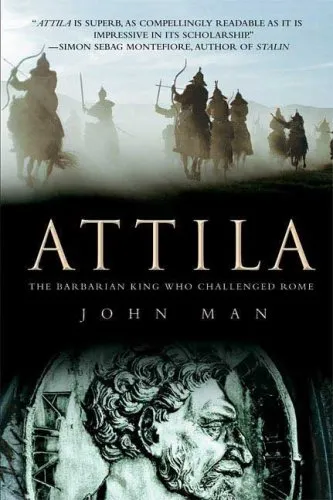A stunning biography of history’s most infamous warlord, Attila the Hun
For a crucial twenty years in the early fifth century, Attila held the fate of the Roman Empire and the future of all Europe in his hands. He created the greatest of barbarian forces, and his empire briefly rivaled Rome’s. In numerous raids and three major campaigns against the Roman Empire, he earned himself an instant and undying reputation for savagery. But there was more to him than mere barbarism. Attila was capricious, arrogant, brutal, and brilliant enough to win the loyalty of millions. In the end, his ambitions ran away with him. He did not live long enough to found a lasting empire—but long enough to jolt Rome toward its final fall.
In this riveting biography, masterful storyteller John Man draws on his extensive travels through Attila’s heartland and his experience with the nomadic traditions of Central Asia to reveal the man behind the myth. John Man is a historian and travel writer with a special interest in Mongolia. His Gobi: Tracking the Desert was the first book on the subject in English since the 1920s. He is also the author of Atlas of the Year 1000, Alpha Beta, on the roots of the Roman alphabet, and The Gutenberg Revolution, on the origins and impact of printing. Genghis Khan: Life, Death, and Resurrection was published in 2005. For a crucial twenty years in the early fifth century, Attila held the fate of the Roman Empire and the future of all Europe in his hands. The decaying imperium, dominating the West from its twin capitals of Rome and Constantinople, was threatened by barbarian tribes from the East. It was Attila who created the greatest of barbarian forces. His empire briefly rivaled Rome's, reaching from the Rhine to the Black Sea, the Baltic to the Balkans. In numerous raids and three major campaigns against the Roman Empire, he earned himself an instant and undying reputation for savagery. But there was more to him than mere barbarism. Attila's power derived from his astonishing character. He was capricious, arrogant, and brutal—but also brilliant enough to win the loyalty of millions. Huns thought him semidivine, Goths and other barbarians adored him, educated Westerners were proud to serve him. Attila was also a canny politician. From his base in the Hungarian grasslands, he sent Latin and Greek secretaries to blackmail the Roman Empire. Like other despots, before and since, he relied on foreign financial backing and knew how to play upon the weaknesses of his friends and enemies. With this unique blend of qualities, Attila very nearly dictated Europe's future. In the end, his ambitions ran away with him. An insane demand for the hand of a Roman princess and assaults too deep into France and Italy led to sudden death in the arms of a new wife. He did not live long enough to found a lasting empire— but enough to jolt Rome toward its final fall. In this biography, John Man draws on his extensive travels through Attila's heartland and his experience with the nomadic traditions of Central Asia to reveal the man behind the myth. "Racy and imaginative . . . puts flesh and bones on one of history's most turbulent characters . . . The rise and fall of Attila, as meteoric and momentous as Napoleon's or Hitler's, makes for fascinating reading in any form."—The Guardian (UK) "This bright, engaging, and breezy book . . . suits the tenor of our times."—The Times (London) "John Man's account . . . sympathetically and readably puts flesh and bones on one of history's most turbulent characters."—Sunday Telegraph (UK)
"One could not wish for a better storyteller or analyst than John Man . . . His Attila is superb, as compellingly readable as it is impressive in its scholarship: with his light touch, the Huns and their king live as never before . . . There is something fascinating and new on every page."—Simon Sebag Montegiore, author of Stalin
"A surprisingly intimate view of the man labeled 'God’s scourge' by a Roman Empire in its death throes. British historian Man is also a travel writer, and his physical knowledge of the venues about which he writes lend authority to his reconstitution of ancient history. In recalling a certain Carpathian pass, for instance, through which the Hunnish horde would have passed on its way to wreak havoc and chaos on the fifth-century remnants of Imperial Roman civil order, he writes, 'Good skiing in winter; pleasant Alpine hikes in summer.' He's equally adept at mining scholarly and contemporary sources: In a nearly chapter-long paraphrase of Priscus, the one Roman administrative apparatchik to have met Attila and left an extensive written record, Man serves up an episode of courtly intrigue worthy of Shakespeare. The author tends to favor the speculative view that the Huns were descendants of a central Asian tribe with possible Turkish origins known by the Chinese, whom they first harassed, as the Xiongnu (pronounced with a guttural 'h' sound). Their military might, derived from a pastoral nomadic ancestry, was based on the terrifying expertise of mounted archers; their power would not be surpassed, Man suggests, until the modern era of automatic weapons. Couple this with the known cruelty (at least in the view of contemporaries including other so-called barbarians) of a short, unattractive, but definitely charismatic man with beady, shifty eyes who regularly impaled his captive victims on wooden stakes, and the basis for the myth of Attila becomes clear. Yet, the author notes, in Eastern Europe, particularly Hungary, it persists as the legend of a hero. Entertaining and lucid account of a phenomenal militarist unable to resist a crumbling empire's vast, unprotected wealth.”—Kirkus Reviews "Man, a historian with an interest in Mongolia and archaeology, has written a popular history as much about the Huns as about their notorious leader. He begins by identifying the Huns as possible descendants of Turkish nomads who created the first large steppe empire beyond China's western borders on the strength of their horse-mounted archers. The steppe empire would, in time, be crushed by the Chinese, its remnants fleeing west to become the Huns. This old theory of Hunnic origins has gained new authority owing to recent archaeological finds in the Altai Mountains and advancements in the study of Mongolian folklore. Man's chapter on the causes for the Huns' military superiority is fascinating, relying on the work of the Hungarian archer expert Lajos Kassai. After years of study and practice, Kassai re-created the bow and the riding and shooting skills of the Hunnish horse archers. His demonstrations of horse archery have given onlookers a chilling glimpse into the destructive power of Attila's mounted archers. Man's book is a highly readable account of a bellicose steppe people and their leader who, long after they departed from the West, continue to haunt the European imagination. Highly recommended."—Library Journal "Attila the Hun was 'the Genghis Khan of Europe,' says British historian Man in this fast-paced though often prosaic account of the rise and fall of the Huns and their infamous leader. Man traces the origin of the Huns, following these restless nomads from the steppes of Mongolia to present-day Hungary. Attila led his people in terrifying raids into new lands in the fifth century. Relying on scant





